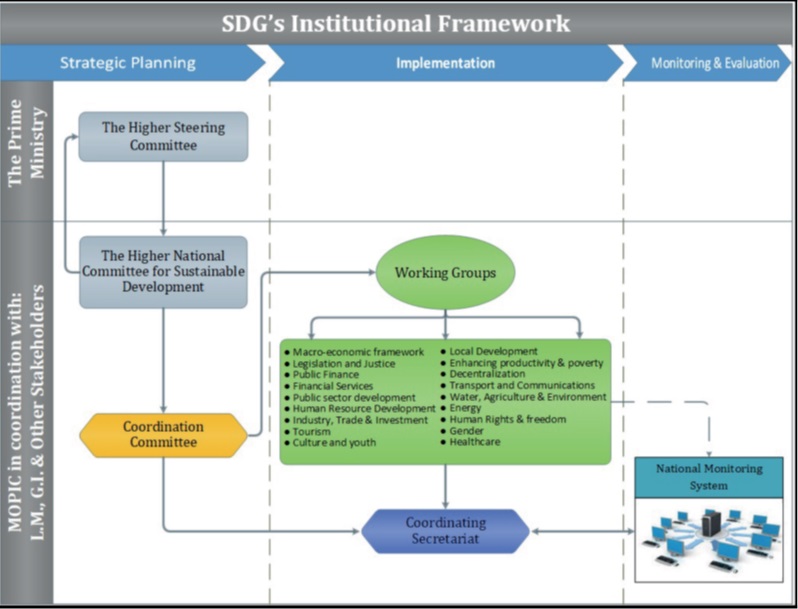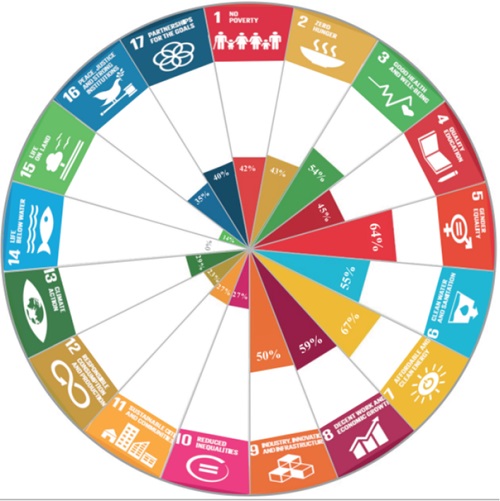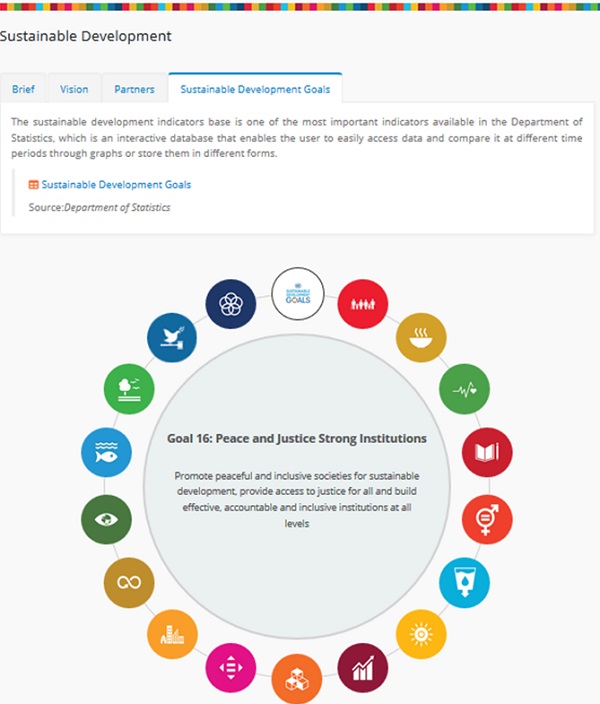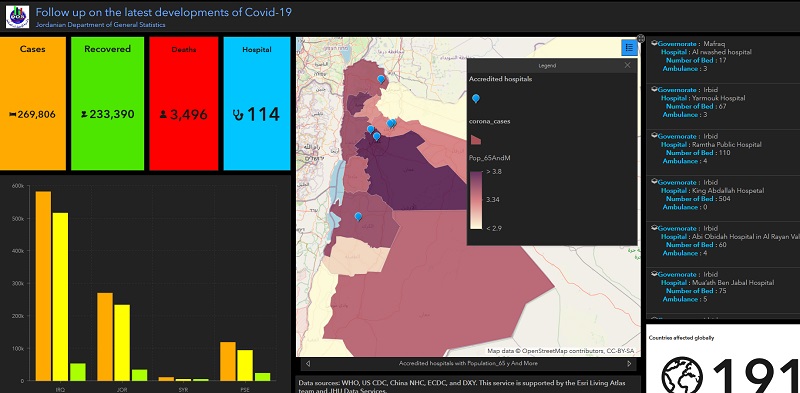Jordan
I. General on SDG monitoring set up
National SDG organizational set up
In order to ensure efficient alignment, and to emphasize a commitment to all SDGs within national priorities, the Government has opted to ensure that no overlapping mechanisms are established anew and that the implementation of the 2030 Agenda builds upon existing institutional frameworks. These have been further refined to allow for better harmonization. The following chart illustrates the institutional mechanisms adopted to solidly anchor the 2030 Agenda and clarifies the relationship between its various settings.
 Source: First National Voluntary review on the implementation of the 2030 Agenda
Source: First National Voluntary review on the implementation of the 2030 Agenda
National set of SDG indicators
A mapping was conducted between late 2016 and early 2017, comparing goals, targets and indicators from the 2030 Agenda with the national development framework. This was done with the inclusive participation of a wide range of ministries and government institutions, in cooperation with UN agencies. The mapping demonstrated that all goals and most targets are important for Jordan, albeit to varying degrees, especially at the target and indicator levels, it further revealed that:
- The SDGs and associated targets are well mainstreamed into the “Jordan 2025”, EDP and other national strategies;
- On average, 40% of the indicators are considered Tier I, varying from 0 to 14% for SDG14 and SDG15 respectively and 67% for SDG7;
- The sources of data, baselines, targets, and frequency of most of the Tier I indicators were identified.
SDG reports and Voluntary National Reviews
Jordan submitted their VNR as part of the 2017 HLPF. Statistical report was not part of the initial review: https://sustainabledevelopment.un.org/content/documents/16289Jordan.pdf
Jordan achieved significant milestones in the dissemination of key national data during this period. In February 2020, the Depart of Statistics (DoS) launched their SDG dissemination platform, based on PxWeb (http://dosweb.dos.gov.jo/sdgs/). This was delivered through collaboration with UNSD through missions and remote support, including a joint workshop on PxWeb in November 2019 with several other project countries. The dissemination platform was presented to senior government as a highlight of Jordan’s effort to monitor development progress.
Overall coordination of National Statistical System
DOS is responsible for the overall coordination of NSS including coordinating and organizing the statistical work in partnership with the different Governmental departments with a view to developing their statistical administrative records in such a manner that is in line with international practices and standards, guarantees proper timing and meets the requirements of data users efficiently and effectively.
Source: http://dosweb.dos.gov.jo/wp-content/uploads/2017/06/Statistical_Law_No_12_of2012-e.pdf
SDG data coordination committees and Responsibility for SDG indicator compilation
The DOS maintains the responsibility of quality assurance and clearance of all indicators and a special SDG team within the DOS has been established for this purpose. The responsibilities related to quality assurance for the SDG indicators will be reflected in the National Statistical Strategy, currently under development, which will also focus upon the importance of strengthening the quality of administrative records in covering important gaps in data in the future.
Source: https://sustainabledevelopment.un.org/content/documents/16289Jordan.pdf
The (DoS) is considered – by virtue of law - the sole official body for collecting and disseminating demographic, social, economic and agricultural statistics. The (DoS) has worked consistently to unify the statistical figure in Jordan and to develop the administrative records through concluding memoranda of understanding (MoUs) with the ministries and government institutions to develop the statistical system in Jordan.
Source: http://dosweb.dos.gov.jo/wp-content/uploads/2017/06/Statistical_Law_No_12_of2012-e.pdf
Actual data sharing mechanisms
By their statistical law, Governmental departments shall undertake to facilitate the tasks of the Department’s employees commissioned with any statistical or census activity, guarantee easy contacts with the relevant parties, and supply all the information they request for statistical purposes, including allowing said employees to examine records and other means of storing information.
Governmental departments are further obligated to coordinate with the Department before effecting any amendments to the forms of the records or the statistical mechanisms they employ, in order to guarantee that these records, forms and mechanisms achieve the purposes of statistical work.
Source: http://dosweb.dos.gov.jo/wp-content/uploads/2017/06/Statistical_Law_No_12_of2012-e.pdf
DoS made SDG indicator data on their platform available to all.
IV. Data availability and disaggregation
Work to make more indicators available and Work to allow more disaggregation
Jordan prioritizes strengthening national statistical systems and availability of data through providing technical support to the Department of Statistics (DOS) to ensure the availability of missing data from DOS or other data providers and robust quality control mechanisms.
In October 2019, UNSD conducted a metadata workshop in Amman, Jordan, with over 30 participants from DoS, line ministries, specialized agencies and public institutions responsible for SDG indicators. The four-day workshop focused on hands-on, practical sessions on compiling national metadata with inputs from all relevant ministries and agencies. Unfortunately, the Covid-19 Pandemic has stalled some activities, including metadata compilation and dissemination.
In 2017, Jordan issued a Roadmap towards ownership and achievement of SDGs in the 2030 Agenda including prioritizing Jordan prioritizes strengthening DoS capacity in data quality assurance.
The Department of Statistics has begun to draft a strategy to engage data users through dialogue with users to identify the suitable means of exchanging data regarding to SDGs. This user engagement strategy sets out the path towards continuous dialogue between users and producers of statistics to meet the goals and objectives of the strategic documents mentioned above. It lays out the means of engagement to facilitate interactions with different user groups.
Implementation plan and activities
Planned Activities include:- Improve feedback mechanisms that facilitate input from users
- Compile and disseminate high quality data and statistics efficiently based on user needs, and in easy to access and understand format to support decision making.
- Raise awareness and engagement around data and statistics and build statistical literacy among user groups.
- Adhere to international standards and best practices to enhance trust of users in the quality and reliability of the statistics produced.
UNSD has supported DoS in developing their own COVID-19 data hubs. DoS were already using the ArcGIS technology to support their day to day operations and were able to establish their COVID-19 Data Hub relatively quickly as they were familiar with the technology that supported the establishment of the hub.



 Source:
Source: 
